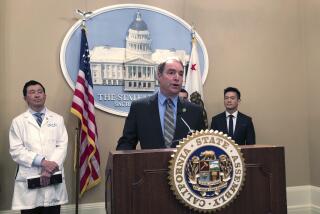Smoking Is Losing, Claims Leader in War on Old Habit
- Share via
America is winning its battle to eradicate smoking, according to David Burns, an associate clinical professor of medicine at UC San Diego’s Medical Center.
Progress toward a smoke-free society has been “stunning . . . and astounding . . . given how long it takes for social change with a problem of this magnitude,” Burns said. “It’s very similar to what’s occurred with Mothers Against Drunk Drivers.”
Smoking has long been approached as an individual problem, but it’s now seen as a larger social issue, Burns said.
Burns no longer debates tobacco company representatives over the health effects of smoking, “because it’s no longer open to debate. . . . This agent causes cancer.” The debates he now takes part in focus on other issues--such as where and when smoking should be allowed.
Burns applauded San Diego’s health, civic and school leaders for taking steps to limit where and when smokers can light up. He is also buoyed by the passage of Proposition 99 last November, which authorized the state to use a tobacco tax to fund research into programs that will keep nonsmokers from starting to smoke as well as to help smokers quit.
Proposition 99’s passage signaled the public’s growing belief that smokers and tobacco companies should foot the bill for research, he said.
Nationally, Burns is encouraged that the National Cancer Institute, which traditionally has funded research into curing cancer, now funds research that will help smokers quit--as well as preventing others from starting.
“NCI is looking at what will work in schools, the doctor’s office, with women, blacks and Hispanics,” he said. They are testing to find out what works in various segments of the community, he said.
More to Read
Sign up for Essential California
The most important California stories and recommendations in your inbox every morning.
You may occasionally receive promotional content from the Los Angeles Times.













